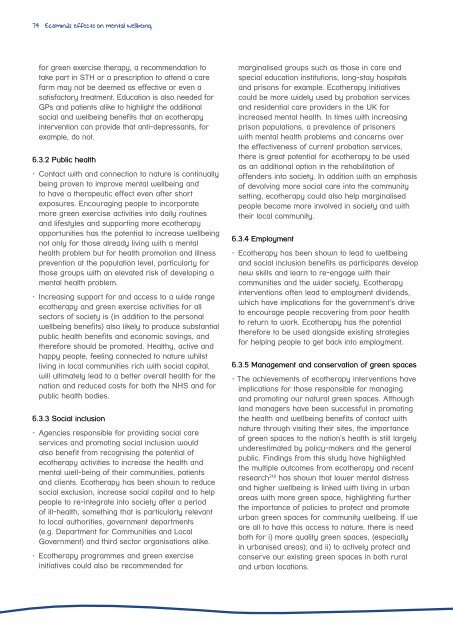Ecominds-effects-on-mental-wellbeing-evaluation-report
Ecominds-effects-on-mental-wellbeing-evaluation-report
Ecominds-effects-on-mental-wellbeing-evaluation-report
You also want an ePaper? Increase the reach of your titles
YUMPU automatically turns print PDFs into web optimized ePapers that Google loves.
74 <str<strong>on</strong>g>Ecominds</str<strong>on</strong>g> <str<strong>on</strong>g>effects</str<strong>on</strong>g> <strong>on</strong> <strong>mental</strong> <strong>wellbeing</strong>for green exercise therapy, a recommendati<strong>on</strong> totake part in STH or a prescripti<strong>on</strong> to attend a carefarm may not be deemed as effective or even asatisfactory treatment. Educati<strong>on</strong> is also needed forGPs and patients alike to highlight the additi<strong>on</strong>alsocial and <strong>wellbeing</strong> benefits that an ecotherapyinterventi<strong>on</strong> can provide that anti-depressants, forexample, do not.6.3.2 Public health• C<strong>on</strong>tact with and c<strong>on</strong>necti<strong>on</strong> to nature is c<strong>on</strong>tinuallybeing proven to improve <strong>mental</strong> <strong>wellbeing</strong> andto have a therapeutic effect even after shortexposures. Encouraging people to incorporatemore green exercise activities into daily routinesand lifestyles and supporting more ecotherapyopportunities has the potential to increase <strong>wellbeing</strong>not <strong>on</strong>ly for those already living with a <strong>mental</strong>health problem but for health promoti<strong>on</strong> and illnesspreventi<strong>on</strong> at the populati<strong>on</strong> level, particularly forthose groups with an elevated risk of developing a<strong>mental</strong> health problem.• Increasing support for and access to a wide rangeecotherapy and green exercise activities for allsectors of society is (in additi<strong>on</strong> to the pers<strong>on</strong>al<strong>wellbeing</strong> benefits) also likely to produce substantialpublic health benefits and ec<strong>on</strong>omic savings, andtherefore should be promoted. Healthy, active andhappy people, feeling c<strong>on</strong>nected to nature whilstliving in local communities rich with social capital,will ultimately lead to a better overall health for thenati<strong>on</strong> and reduced costs for both the NHS and forpublic health bodies.6.3.3 Social inclusi<strong>on</strong>• Agencies resp<strong>on</strong>sible for providing social careservices and promoting social inclusi<strong>on</strong> wouldalso benefit from recognising the potential ofecotherapy activities to increase the health and<strong>mental</strong> well-being of their communities, patientsand clients. Ecotherapy has been shown to reducesocial exclusi<strong>on</strong>, increase social capital and to helppeople to re-integrate into society after a periodof ill-health, something that is particularly relevantto local authorities, government departments(e.g. Department for Communities and LocalGovernment) and third sector organisati<strong>on</strong>s alike.• Ecotherapy programmes and green exerciseinitiatives could also be recommended formarginalised groups such as those in care andspecial educati<strong>on</strong> instituti<strong>on</strong>s, l<strong>on</strong>g-stay hospitalsand pris<strong>on</strong>s for example. Ecotherapy initiativescould be more widely used by probati<strong>on</strong> servicesand residential care providers in the UK forincreased <strong>mental</strong> health. In times with increasingpris<strong>on</strong> populati<strong>on</strong>s, a prevalence of pris<strong>on</strong>erswith <strong>mental</strong> health problems and c<strong>on</strong>cerns overthe effectiveness of current probati<strong>on</strong> services,there is great potential for ecotherapy to be usedas an additi<strong>on</strong>al opti<strong>on</strong> in the rehabilitati<strong>on</strong> ofoffenders into society. In additi<strong>on</strong> with an emphasisof devolving more social care into the communitysetting, ecotherapy could also help marginalisedpeople become more involved in society and withtheir local community.6.3.4 Employment• Ecotherapy has been shown to lead to <strong>wellbeing</strong>and social inclusi<strong>on</strong> benefits as participants developnew skills and learn to re-engage with theircommunities and the wider society. Ecotherapyinterventi<strong>on</strong>s often lead to employment dividends,which have implicati<strong>on</strong>s for the government’s driveto encourage people recovering from poor healthto return to work. Ecotherapy has the potentialtherefore to be used al<strong>on</strong>gside existing strategiesfor helping people to get back into employment.6.3.5 Management and c<strong>on</strong>servati<strong>on</strong> of green spaces• The achievements of ecotherapy interventi<strong>on</strong>s haveimplicati<strong>on</strong>s for those resp<strong>on</strong>sible for managingand promoting our natural green spaces. Althoughland managers have been successful in promotingthe health and <strong>wellbeing</strong> benefits of c<strong>on</strong>tact withnature through visiting their sites, the importanceof green spaces to the nati<strong>on</strong>’s health is still largelyunderestimated by policy-makers and the generalpublic. Findings from this study have highlightedthe multiple outcomes from ecotherapy and recentresearch 218 has shown that lower <strong>mental</strong> distressand higher <strong>wellbeing</strong> is linked with living in urbanareas with more green space, highlighting furtherthe importance of policies to protect and promoteurban green spaces for community <strong>wellbeing</strong>. If weare all to have this access to nature, there is needboth for i) more quality green spaces, (especiallyin urbanised areas); and ii) to actively protect andc<strong>on</strong>serve our existing green spaces in both ruraland urban locati<strong>on</strong>s.



